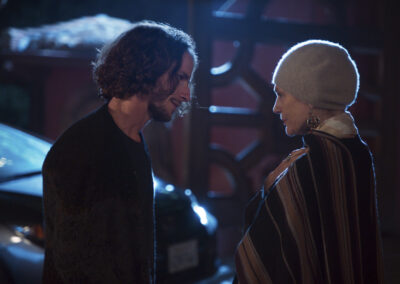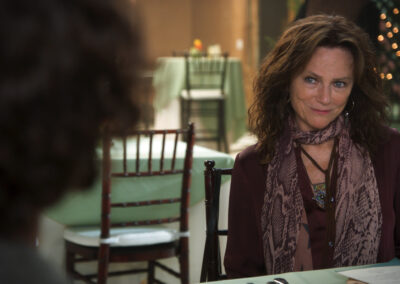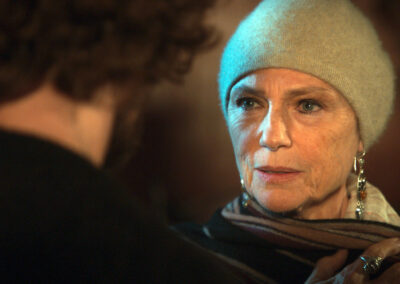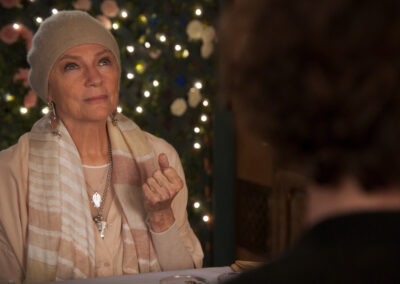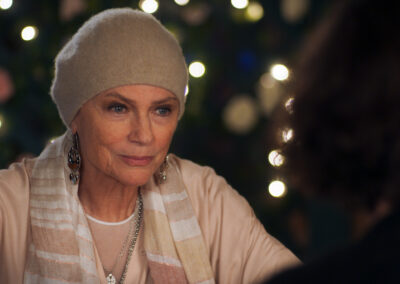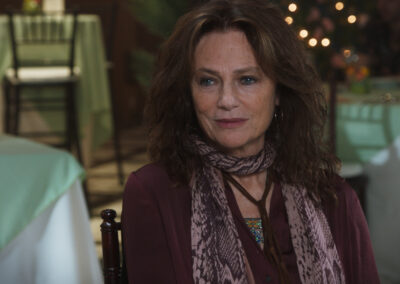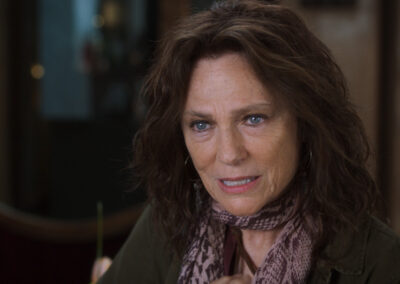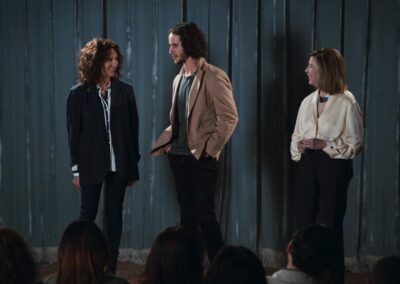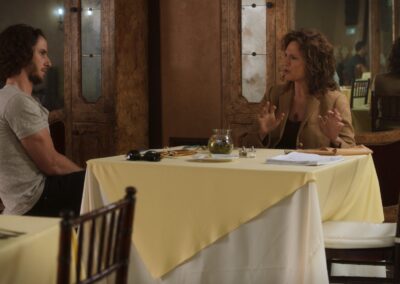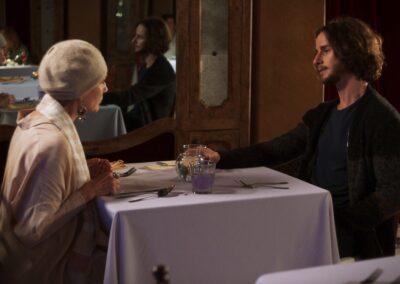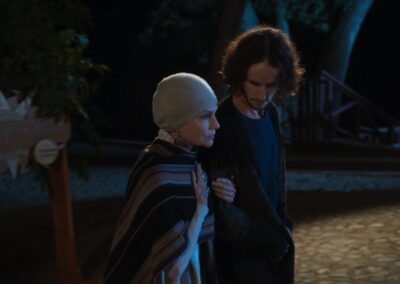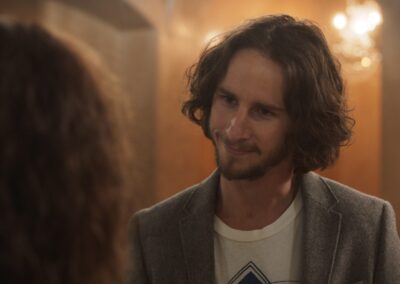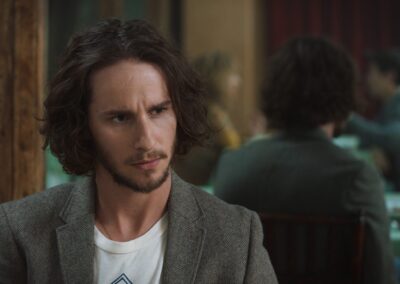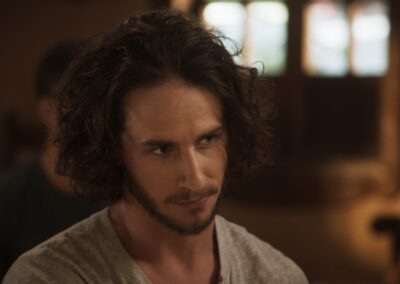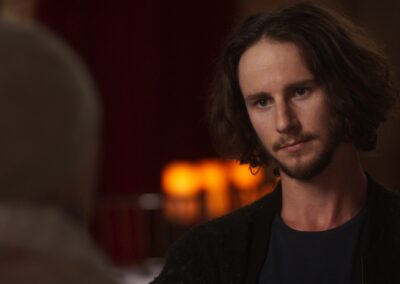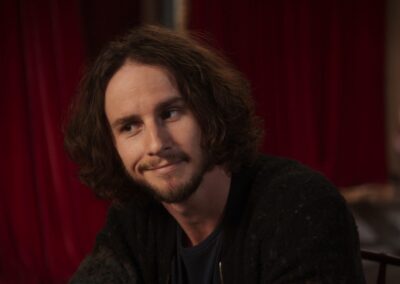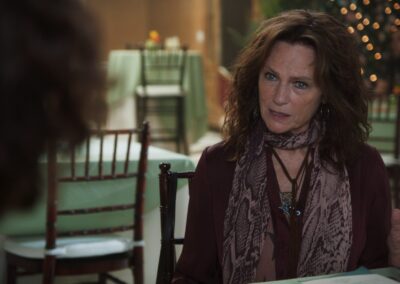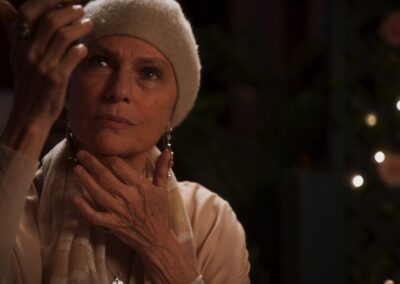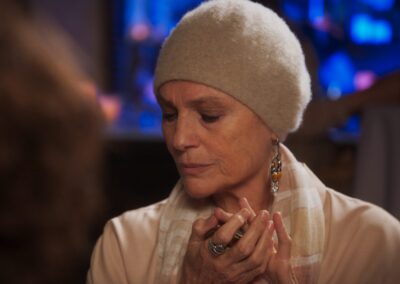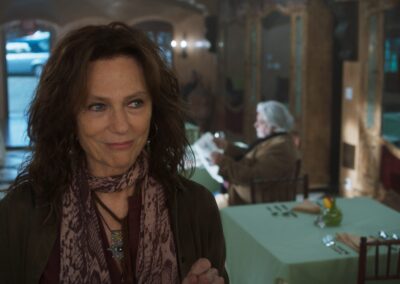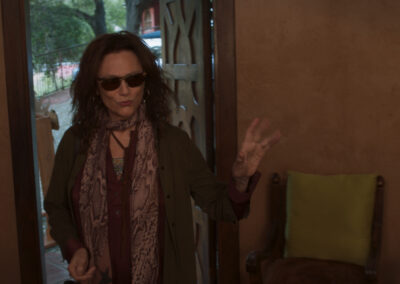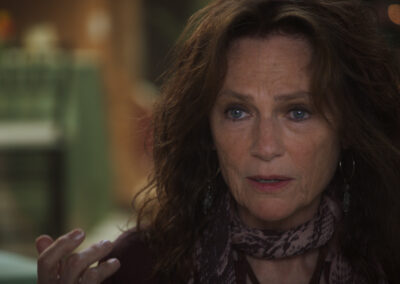Loren & Rose
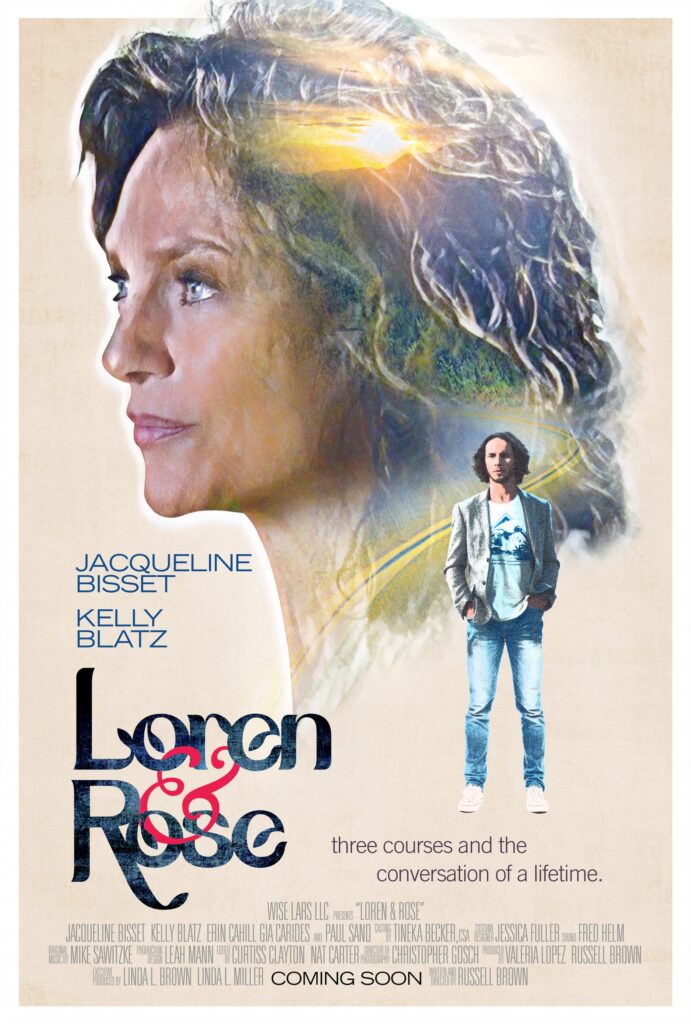
Synopsis
Festivals
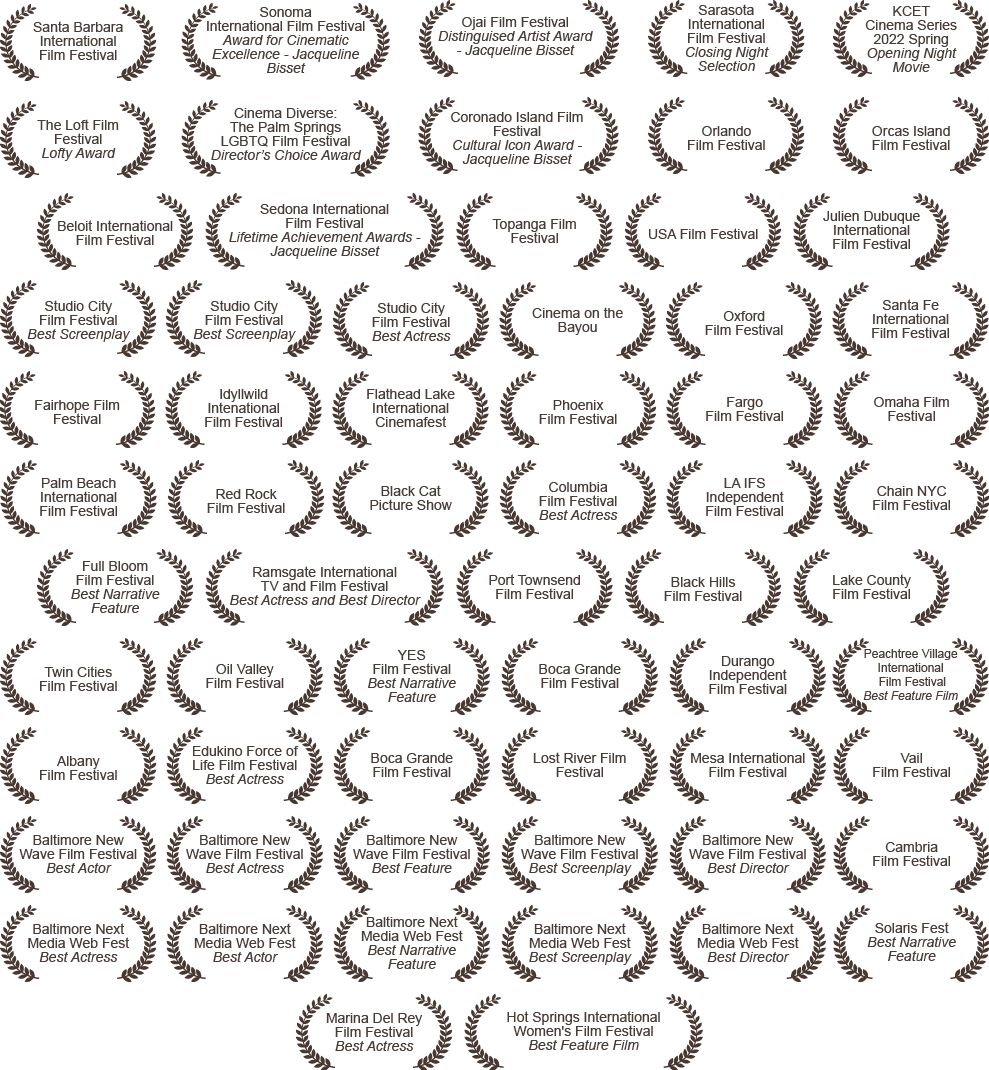
Director's Notes
One of the secret joys of making films is listening to actors — many of whom have lived passionate and offbeat lives — share their stories when the cameras aren’t rolling. The early drafts of Loren & Rose started as monologues told by a fictional actress mentor, a type of Scheherazade who could spin tales of spiced foreign lands and honeyed liaisons conjured from a combination of her memory and imagination.
As Rose herself came more into focus, her rich descriptions of art, music, food and travel became windows into a complicated past and unresolved present. And so, Loren entered as both the willing recipient of her experience and wisdom but also as the unconditional gaze that helps restore Rose’s sense of herself.
As the writing continued, I became more engaged with the questions of the relationship between mentors and students. What do they give to each other? Why are these friendships so potent and profound? How is this interaction the same as — and yet so different from — other types of friendships or family relationships? Loren & Rose depicts what I think is so common to those engaged in artistic pursuits — the gifts our muses give us, the legacies that the old pass to the young, and the circular nature of teacher and student.
Writing the screenplay took approximately three years, a constant process of pruning and perfecting the threads that link the conversation. Throughout, I lived the question: How do I keep this film — so static in nature and outwardly plotless — engaging for an audience? I relied on embedding the film with subtle conflicts between my main characters, and pruning the dialogue so carefully that it never wandered or felt unconnected to the DNA of the story of this relationship. For that reason, many of my favorite passages (in terms of the written word) didn’t make it to the shooting script, because they didn’t connect directly to the emotional arcs of the characters. It was essential, as well, that the language be constantly vibrant — one must “get lost in the sounds of the words,” as Rose says.
The film is deliberately framed as a memory play, and the aesthetic choices — the mystical look and feel of the restaurant, the constant play against mirrors, the smoky score tinged with eastern vibes — are meant to support this conceit. Towards the end of the movie, Loren says that Rose has grown “more magical in my memory, as time goes by.” It was important that there be a sense throughout that this is “how Loren is remembering things” — it was never the intention for the film to play as “realistic.” It could even be possible that Loren created Rose in his imagination, the figure who would allow him to fully believe in his artistry.
As the story unfolds, the audience is meant to feel how Loren and Rose become increasingly comfortable and honest with each other — their defenses, so present at the beginning — have melted away by their final moments, with each act conveying the feel and function of the different stages of their friendship. The hopeful spring green brightness of the first act grows into the warm late afternoon yellow of part two, and then evolves into the nighttime purplish of part three suggesting a growing spiritual awareness and a sense of impending loss. Similarly, the positioning of the actors in their chairs (dead-on by the end, eye-to-eye) was carefully considered. All of this was in service of a story that while static in setting, covers a vast emotional and philosophical expanse.
Production Notes
Kelly Blatz’s first audition for Loren was somewhat revelatory. I can’t think of another time when an actor has embodied a part so completely from the start. He had a way of making the cultural references that are inherent to Loren’s personality feel completely natural. He is an incredible listener and his powerful gaze draws you in — which was essential to Rose being able to be feel so open with him. As a filmmaker himself, Kelly was able to conjure the “filmmaker-in-training” side of Loren — and all the accompanying pathos of the ups-and- downs of this work. Our casting director, Tineka Becker, drilled down on what was important to find in our Loren, and I’m not sure it would’ve happened without her.
A few words must also be said of Paul Sand, playing Phil, who brings a centeredness to the restaurant and was able to establish a rapport with Jacqueline so the moments of this restaurant as “her favorite place” were totally authentic. As a veteran actor himself, Paul brought a gravitas to the entire production, and I always felt his watchful and knowing eye on the proceedings.
A director could not have a better ally than producer Valeria Lopez. Every low budget independent film has its share of challenges, and she faced ours with courage, strength, intelligence, and best of all, humor. Our production shut down early on for various reasons, and resumed a few months later, and Valeria stood by me during this painful process — always fighting to keep the movie alive.
This is the second time I’ve collaborated with Christopher Gosch, the director of photography. Chris has a calm that creates a freedom and ease on set that is so valuable. The film is lit and framed beautifully. We broke the script down together and carefully plotted how smaller sections — roughly 10-pages at a time — would be approached — and how we could best serve the emotional tone of each section with camera work. The mirrors were a key element as well, and our planning always was about how to keep the frame activated.
Likewise, this is the second film I’ve worked on with Leah Mann, and her contributions are present throughout. The magical ambience of the restaurant and the many props that helped form Rose’s life story are her handiwork. Costume Designer Jessica Fuller was somewhat of a spirit animal for our production — always so buoyant and positive. When we first met, she told me that Alla Nazimova would be her inspiration for Rose, and I knew she was on the right track. She formed a special relationship with Jacqueline, as Rose’s wardrobe throughout was continually evaluated and perfected.
Editor Nat Carter has worked on all my films, but in particular was channeling our experiences collaborating on The Blue Tooth Virgin. That project was also heavily dialogue driven and depended on finding the right rhythms and being “in the right place” for the long dialogue scenes. The legendary editor Dody Dorn came in to help us finish the film over the course of many months, massaging each and every cutpoint. I was honored to be able to work with them — both are mentors of mine and the collaboration was a learning experience for me.
The score was composed by musician Mike Sawitzke who is known as a member of the essential LA band The Eels, and tours regularly with Dispatch. Early on, I gave him a record by Ry Cooder that I felt would be a good reference. A rare instrument — the Mohan Veena — is utilized on that recording, and so he made it the centerpiece for the score. (After a few weeks of trying to locate one.) As a “strings wizard,” Mike was able to quickly learn to play what is a cross between a slide guitar and a sitar. The resulting music — part Eastern opium den, part 1960s psychedelia groove — but often with moments of great heart and warmth — is a score that I think is completely original and totally appropriate.
Linda L. Miller — a producer whose generosity and savvy knows no bounds — was my teammate and cosigliere from early drafts of the script. Fred Helm (sound designer) and Chris Aud (rerecording mixer) overcame some truly challenged production sound, and I’m grateful for their hard work and passion. Our attorney, Shelley Surpin, was always the voice of constancy and reason.
I’d be remiss without mentioning the contributions of my dear friend Per Saari and lovely boyfriend Rory Macleod, both of whom went beyond the call of duty throughout all the challenges of this movie (there were many) and I am truly grateful to both of them.
Credits
Russell Brown
Produced by
Valeria Lopez
Russell Brown
Edited by
Curtiss Clayton
Cinematography by
Christopher Gosch
Starring
Jacqueline Bisset
Kelly Blatz
Paul Sand
Gia Carides
Erin Cahill
Press
Reviews and Interviews
Observer / Rex Reed: Jacqueline Bisset Stuns As An Actress Confronting Her Past
“Beautifully acted, intelligently scripted and sensitively directed, Loren & Rose showcases the undervalued, not always properly showcased talents of Jacqueline Bisset. This is a wonderful film, memorable and carefully made, that succeeds on many levels, but most of all as a welcome vehicle for a splendid, gorgeous star. One of the consistent joys of the movie business, she is still, at 79, nothing less than splendiferous…” — Rex Reed in the Observer
Salon: Jacqueline Bisset and her Loren & Rose director spoke to Salon about filmmaking, influences and collaboration
“Engrossing two-hander… Bisset is marvelous, giving a very enthusiastic performance that leans into her character’s more fanciful moments, and she is a joy to watch…”
Santa Barbara Independent: The Spell of Jacqueline Bisset in Loren & Rose
“Captivating performances… shines with the controlled brilliance of a true star…”
Sonoma Index Tribune: Jacqueline Bisset relishes ‘intimate’ role in latest film
“A complex and riveting performance…”
Filmthreat: Loren & Rose Review
“Bisset dominates, and we can’t help but be enraptured by her … Those hungry for a film that prioritizes a great performance over cheap thrills will not be disappointed.”
Josh at the Movies: SBIFF Review
“A sublime masterpiece of precision and intent…”
San Francisco Bay Times
“Delightful to watch…”
The Montecito Journal: Bisset en Rose
“Appealing…Meaty roles…”
Deadline Hollywood’s Pete Hammond Interviews Jacqueline Bisset, Kelly Blatz and Russell Brown
Joe McGovern from The Wrap Interviews Jacqueline Bisset, Kelly Blatz and Russell Brown
Artsmeme: A rose is Jacqueline Bisset, in new movie, Loren & Rose
“Tender and touching … Ms. Bisset, always a stunning, beautiful woman, at her most incandescent in this courageous performance.”
Hollywood Times: Review
”Absolutely brilliant. This was one of the most touching movies I’ve seen in years wrapped in California sunshine and Topanga Canyon goodness… Rarely does a movie pull at my heartstrings as much as this one.”
Deadline Hollywood: Jacqueline Bisset On A Legendary Career, Surviving Hollywood, And Working With The Greats
”One of the best roles of her career and she delivers a terrific performance…”
On the Red Carpet – Sedona Film Festival
Sedona Film Festival with Chris Munch, Jacqueline Bisset and Russell Brown
Alliance of Women Film Journalists
“Luminous… An adult film … for thinkers and those who love the sounds of the words, well placed and delivered by actors who understand and convey their character’s mission… Blatz and Bisset are electric in the frame together…”
Movie Review Mom
“Bisset gives an impeccable performance filled with dignified exuberance…touching and powerful…a beautiful film to be tasted and consumed…”
NYC Movie Guru
“Brims with wit, wisdom and genuine tenderness…A profoundly human protest for friendship, love and compassions…” —NYC Movie Guru
Unseen Films
“Wise and knowing… If you love good acting or thoughtful films, Loren & Rose is a must.”
Red Carpet Crash
“Ms. Bisset is such a joy to watch, and she seems to be all-in for the role.”
Casting Networks: On the Verge – Kelly Blatz
Haute-Lifestyle
“Perfect, Engaging, Absorbing… “
News and Announcements
San Francisco Chronicle: Datebook
Deadline Hollywood: Jacqueline Bisset to star in Loren & Rose

